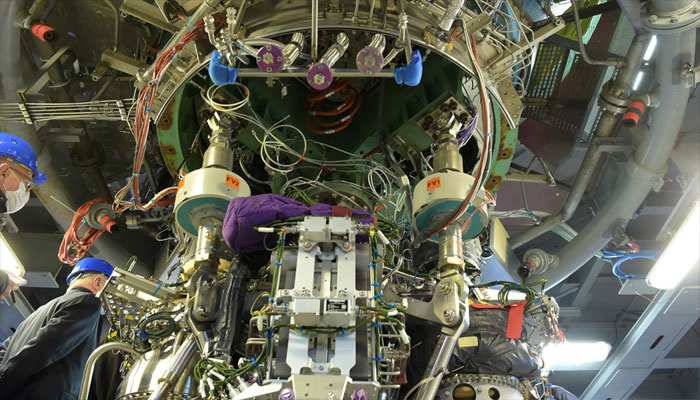Spy in Germany ‘passed rocket details to Russia’
Frankfurt: German prosecutors on Thursday said they had charged a Russian scientist working at a Bavarian university with espionage, accusing him of sharing information about Europe’s Ariane space rocket programme with Moscow.
The accused, identified only as Ilnur N., was arrested last June, the latest in a string of alleged Russian spies uncovered on German soil at a time of the worst tensions between Russia and the West since the Cold War.
Prosecutors allege that Ilnur N. was working at an unnamed Bavarian university when he was contacted by Russian foreign intelligence service SVR in the autumn of 2019 at the latest. After agreeing to cooperate, he "passed on information on research projects in the field of aerospace technology, in particular the various development stages of the European launcher Ariane", prosecutors said in a statement.
The European Space Agency’s Ariane programme consists of a series of transportation rockets designed to ferry heavy loads including satellites into space. The 40-year-old programme is often held up as a model of industrial and political cooperation between European countries, but it faces growing competition from newcomers like Elon Musk’s SpaceX.
According to prosecutors, Ilnur N. held "regular meetings" from late November 2019 onwards with a senior officer of Russia’s foreign intelligence service stationed in Germany. He allegedly received 2,500 euros ($2,800) in cash in exchange for the information he shared, which also included details about his scientific research at the Bavarian university.
According to prosecutors, Ilnur N. worked as a research assistant at the university’s natural sciences and technology department. At the time of his arrest, Augsburg University in southern Germany said Ilnur N. was employed there. The case comes against a backdrop of heightened tensions between Germany and Russia, as the West fears Moscow is planning to invade Ukraine.
German Chancellor Olaf Scholz has vowed that Russia would pay a "high price" for attacking Ukraine. Upping the stakes, German Foreign Minister Annalena Baerbock warned Thursday that the recently completed Nord Stream 2 pipeline between Russia and Germany could be a target of sanctions.
Germany and Russia have also been at odds over the ongoing detention of Kremlin critic Alexei Navalny, who was treated in Berlin after a near-fatal poisoning. Europe’s biggest economy has seen a number of suspected cases of Russian espionage on its soil in recent months.
In October 2021, a German man was handed a two-year suspended sentence for passing on floor plans of parliament buildings to Russian secret services while employed by a security company. Last August, a former employee of the British embassy in Berlin was arrested on suspicion of having passed on documents to Russian intelligence. Germany has also repeatedly accused Russia of cyber espionage attempts.
The most high-profile incident blamed on Russian hackers to date was a cyberattack in 2015 that paralysed the computer network of the Bundestag lower house of parliament, forcing the entire institution offline for days while it was fixed.
Russia denies being behind such activities. Bilateral relations took another hit last month after a German court ruled that Moscow had ordered the 2019 assassination of an ex-Chechen commander in a Berlin park. Berlin expelled two Russian diplomats in response, prompting a tit-for-tat reaction from Russia which rejects any connection to the killing.
-
 Prince William Closes Saudi Arabia Visit With Rare Desert Shot
Prince William Closes Saudi Arabia Visit With Rare Desert Shot -
 'King Charles Acts Fast Or Existential Crisis' Over Andrew Scandal
'King Charles Acts Fast Or Existential Crisis' Over Andrew Scandal -
 Brooklyn Beckham Charging Nearly £300 In Ticket Cost For Burger Festival
Brooklyn Beckham Charging Nearly £300 In Ticket Cost For Burger Festival -
 Prince William Makes Unexpected Stop At Local Market In Saudi Arabia
Prince William Makes Unexpected Stop At Local Market In Saudi Arabia -
 Zayn Malik Shares Important Update About His Love Life
Zayn Malik Shares Important Update About His Love Life -
 Kate Middleton, William Are Holding Onto Their Hats As Worse Gets Threatened: Behind The Veil Of Shame
Kate Middleton, William Are Holding Onto Their Hats As Worse Gets Threatened: Behind The Veil Of Shame -
 British Soap Awards Scrapped Again As ITV Confirms 2026 Hiatus
British Soap Awards Scrapped Again As ITV Confirms 2026 Hiatus -
 Climate Nearing Dangerous Tipping Points, Study Shows
Climate Nearing Dangerous Tipping Points, Study Shows -
 James Van Der Beek, 'Dawson's Creek' Star, Dies At 48
James Van Der Beek, 'Dawson's Creek' Star, Dies At 48 -
 Threads Launches Dear Algo AI Feature To Personalise Feeds In Real Time
Threads Launches Dear Algo AI Feature To Personalise Feeds In Real Time -
 Police Take Action Over Andrew's Ties With Jeffrey Epstein While In UK Office
Police Take Action Over Andrew's Ties With Jeffrey Epstein While In UK Office -
 Courtney Love Makes First Appearance Since New Report On Kurt Cobain's Death
Courtney Love Makes First Appearance Since New Report On Kurt Cobain's Death -
 King Charles Anxious As Uncertainty Grows Over Sarah Ferguson’s Next Move
King Charles Anxious As Uncertainty Grows Over Sarah Ferguson’s Next Move -
 Real Reason Kim Kardashian Is Dating Lewis Hamilton
Real Reason Kim Kardashian Is Dating Lewis Hamilton -
 Rihanna Leaves Elderly Woman Star-struck In Viral Grocery Store Video
Rihanna Leaves Elderly Woman Star-struck In Viral Grocery Store Video -
 TikTok US Launches Local Feed Using Precise Location Data
TikTok US Launches Local Feed Using Precise Location Data




